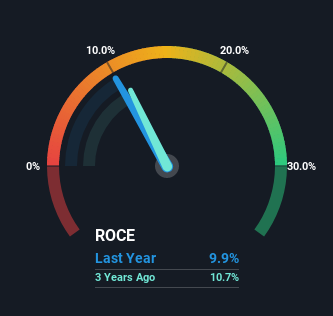There Are Reasons To Feel Uneasy About Volvo Car AB (publ.)'s (STO:VOLCAR B) Returns On Capital

If you're not sure where to start when looking for the next multi-bagger, there are a few key trends you should keep an eye out for. Firstly, we'll want to see a proven return on capital employed (ROCE) that is increasing, and secondly, an expanding base of capital employed. Ultimately, this demonstrates that it's a business that is reinvesting profits at increasing rates of return. However, after briefly looking over the numbers, we don't think Volvo Car AB (publ.) (STO:VOLCAR B) has the makings of a multi-bagger going forward, but let's have a look at why that may be.
Understanding Return On Capital Employed (ROCE)
For those that aren't sure what ROCE is, it measures the amount of pre-tax profits a company can generate from the capital employed in its business. To calculate this metric for Volvo Car AB (publ.), this is the formula:
Return on Capital Employed = Earnings Before Interest and Tax (EBIT) ÷ (Total Assets - Current Liabilities)
0.099 = kr18b ÷ (kr315b - kr135b) (Based on the trailing twelve months to September 2022).
Therefore, Volvo Car AB (publ.) has an ROCE of 9.9%. On its own that's a low return on capital but it's in line with the industry's average returns of 10%.
Check out our latest analysis for Volvo Car AB (publ.)

Above you can see how the current ROCE for Volvo Car AB (publ.) compares to its prior returns on capital, but there's only so much you can tell from the past. If you're interested, you can view the analysts predictions in our free report on analyst forecasts for the company.
So How Is Volvo Car AB (publ.)'s ROCE Trending?
When we looked at the ROCE trend at Volvo Car AB (publ.), we didn't gain much confidence. Around five years ago the returns on capital were 15%, but since then they've fallen to 9.9%. Meanwhile, the business is utilizing more capital but this hasn't moved the needle much in terms of sales in the past 12 months, so this could reflect longer term investments. It's worth keeping an eye on the company's earnings from here on to see if these investments do end up contributing to the bottom line.
Another thing to note, Volvo Car AB (publ.) has a high ratio of current liabilities to total assets of 43%. This can bring about some risks because the company is basically operating with a rather large reliance on its suppliers or other sorts of short-term creditors. Ideally we'd like to see this reduce as that would mean fewer obligations bearing risks.
The Key Takeaway
To conclude, we've found that Volvo Car AB (publ.) is reinvesting in the business, but returns have been falling. And investors appear hesitant that the trends will pick up because the stock has fallen 31% in the last year. On the whole, we aren't too inspired by the underlying trends and we think there may be better chances of finding a multi-bagger elsewhere.
While Volvo Car AB (publ.) doesn't shine too bright in this respect, it's still worth seeing if the company is trading at attractive prices. You can find that out with our FREE intrinsic value estimation on our platform.
While Volvo Car AB (publ.) may not currently earn the highest returns, we've compiled a list of companies that currently earn more than 25% return on equity. Check out this free list here.
New: Manage All Your Stock Portfolios in One Place
We've created the ultimate portfolio companion for stock investors, and it's free.
• Connect an unlimited number of Portfolios and see your total in one currency
• Be alerted to new Warning Signs or Risks via email or mobile
• Track the Fair Value of your stocks
Have feedback on this article? Concerned about the content? Get in touch with us directly. Alternatively, email editorial-team (at) simplywallst.com.
This article by Simply Wall St is general in nature. We provide commentary based on historical data and analyst forecasts only using an unbiased methodology and our articles are not intended to be financial advice. It does not constitute a recommendation to buy or sell any stock, and does not take account of your objectives, or your financial situation. We aim to bring you long-term focused analysis driven by fundamental data. Note that our analysis may not factor in the latest price-sensitive company announcements or qualitative material. Simply Wall St has no position in any stocks mentioned.
About OM:VOLCAR B
Volvo Car AB (publ.)
Designs, develops, manufactures, markets, and sells cars in Sweden and internationally.
Flawless balance sheet and good value.
Similar Companies
Market Insights
Community Narratives



